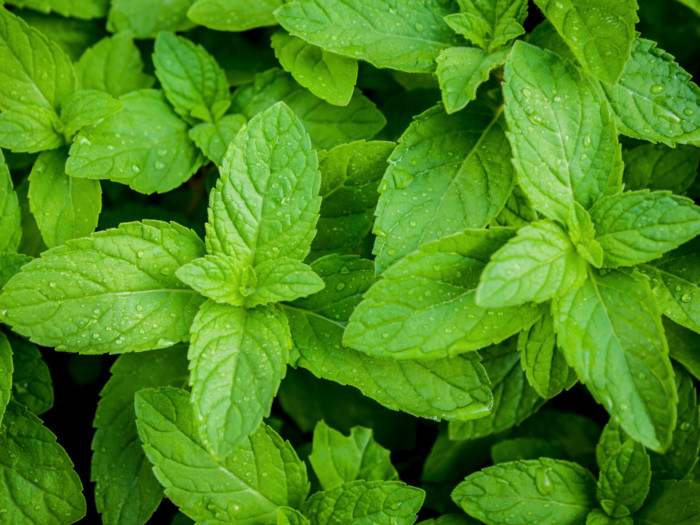While many people recognize the flavor of peppermint, there are also a number of health benefits associated with this plant.
What is Peppermint?
Peppermint scientifically known as Mentha x Piperitais is a type of hybrid mint, bred through a combination of spearmint and watermint. It has a spicy refreshing flavor that makes it a popular ingredient in many different foods, candies, and desserts, among others. The leaves of this plant are the primary parts that are used, due to the presence of the essential oil, which contains high levels of menthone, menthol, limonene, and various other acids, compounds, and antioxidants. While many people use the terms mint and peppermint interchangeably, mint may refer to different types of mint, whereas the latter is a specific variety. [1]
The plant is native to Europe and the Middle East and is now considered invasive species in many other parts of the world, including United States, Australia, New Zealand, and the Galapagos Islands, among others. These aromatic plants prefer to grow in moist and damp areas and grows by putting out runners, rather than reproducing via seed dispersal.

You can add fresh peppermint leaves to green salads, smoothies, and even water. Photo Credit: Shutterstock
Serving Size : Nutrient Value Water [g] 78.65 Energy 70 Energy [kJ] 293 Protein [g] 3.75 Total lipid (fat) [g] 0.94 Ash [g] 1.76 Carbohydrate, by difference [g] 14.89 Fiber, total dietary [g] 8 Calcium, Ca [mg] 243 Iron, Fe [mg] 5.08 Magnesium, Mg [mg] 80 Phosphorus, P [mg] 73 Potassium, K [mg] 569 Sodium, Na [mg] 31 Zinc, Zn [mg] 1.11 Copper, Cu [mg] 0.33 Manganese, Mn [mg] 1.18 Vitamin C, total ascorbic acid [mg] 31.8 Thiamin [mg] 0.08 Riboflavin [mg] 0.27 Niacin [mg] 1.71 Pantothenic acid [mg] 0.34 Vitamin B-6 [mg] 0.13 Folate, total [µg] 114 Folate, food [µg] 114 Folate, DFE [µg] 114 Vitamin A, RAE [µg] 212 Vitamin A, IU [IU] 4248 Fatty acids, total saturated [g] 0.25 14:0 [g] 0.01 16:0 [g] 0.18 18:0 [g] 0.03 Fatty acids, total monounsaturated [g] 0.03 16:1 [g] 0 18:1 [g] 0.03 Fatty acids, total polyunsaturated [g] 0.51 18:2 [g] 0.07 18:3 [g] 0.44 Phytosterols [mg] 13 Tryptophan [g] 0.06 Threonine [g] 0.15 Isoleucine [g] 0.15 Leucine [g] 0.28 Lysine [g] 0.16 Methionine [g] 0.05 Cystine [g] 0.04 Phenylalanine [g] 0.19 Tyrosine [g] 0.11 Valine [g] 0.19 Arginine [g] 0.17 Histidine [g] 0.08 Alanine [g] 0.2 Aspartic acid [g] 0.44 Glutamic acid [g] 0.41 Glycine [g] 0.18 Proline [g] 0.15 Serine [g] 0.15 Sources include : USDA [2]
Peppermint Benefits
There is a wide range of health effects associated with peppermint including its ability to relieve hay fever symptoms, prevent nausea, vomiting, and improve memory and cognitive performance, among many others.
- Relieving the common cold and respiratory conditions
- Easing menstrual symptoms
- Healing chronic wounds
- Relieve spasms and pain
- Providing relief from infantile colic
- Clearing out the sinuses [3]
- Relieving allergic rhinitis (hay fever)
- Soothing symptoms of irritable bowel syndrome (IBS)
- Giving relief from headaches and migraines
- Improving the health of the skin
- Boosting energy levels
- Preventing nausea and vomiting
- Lessening the severity of heartburn
- Improving cognitive health [4]
- Increasing hair health and strength
- Reducing stress and anxiety
- Treating dyspepsia
- Anticancer potential
- Protecting against dental cavities and bad breath
Uses
Peppermint has a number of uses both medicinal and culinary, including being used as the following: [5]
- Oil: The oil is commonly applied to the skin to release information and respiratory problems.
- Tea: Drinking peppermint tea is an excellent way to relieve stress and anxiety and boost energy levels.
- Tinctures and Extracts: These are typically used in a higher concentration for internal healing and more serious health conditions.
- Flavoring Agent: This plant is also a popular flavoring agent in many foods, candies, beverages, and baked goods.
Different parts of this plant, including seeds and leaves, are used differently.
Side Effects
Although there are many positive effects of peppermint, there are also a number of negative side effects associated.
- Pregnant or Breastfeeding: If you’re pregnant or breastfeeding, it is best to avoid peppermint oil and extract, as the concentration of active ingredients could be dangerous for the baby.
- Contact Dermatitis: Many people are allergic to this plant and will experience contact dermatitis when touching any of these substances.
- Gastrointestinal Issues: Some people also report gastrointestinal problems getting diarrhea and gastritis when using peppermint, particularly in excess. [6]
